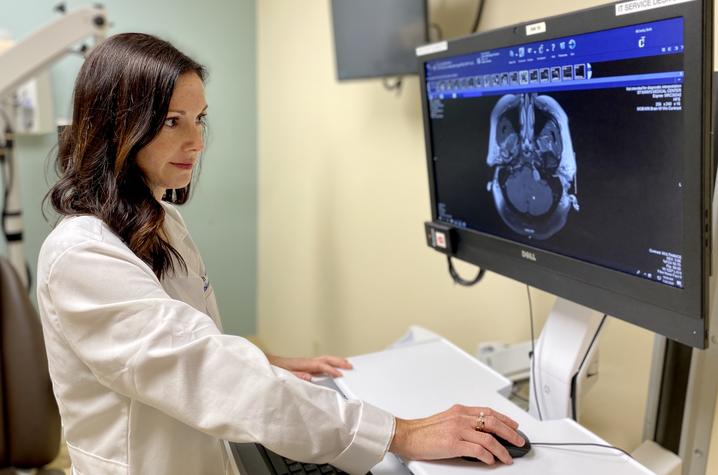UK physician highlights treatment for 'hidden disability' of hearing loss

LEXINGTON, Ky. (March 1, 2024) — Forty years ago, there was no effective treatment for deafness.
Now, a nine-month-old infant can get a cochlear implant — a procedure that first got Food and Drug Administration approval in 1984.
“In my opinion, it is one of the greatest achievements of modern medicine,” said UK HealthCare physician Beth McNulty, M.D. McNulty is a neurotologist — a doctor who specializes in the ears, nose and throat, commonly known as ENT.
A cochlear implant is a small device implanted into the inner ear that converts acoustic energy into electric energy, stimulating the nerve of hearing electrically. The device may restore hearing in those born with congenital deafness, as well as patients with slowly progressive hearing loss for whom hearing aids no longer work.
“Cochlear implants are performed on infants up to 103-year-olds,” McNulty said. "I always counsel patients that there's no age limit. We treat each patient individually as far as candidacy for surgery.”
That sense of sound can help a deaf mother hear her crying infant or help a baby born deaf learn to speak. In honor of World Hearing Day this Sunday, March 3, McNulty wanted to highlight how the gift of hearing can connect people and change lives.
“As the hearing loss progresses to the point of cochlear implantation, a lot of patients feel isolated, they feel like they have no hope,” McNulty said. “Communication is what ties you to the world.”
World Hearing Day brings awareness for hearing loss — so often an invisible disability. That became particularly apparent during the COVID-19 pandemic and patients who were hard of hearing couldn’t read the lips of masked people.
“It caused frustration for them, for those trying to communicate with them, like, ‘Why can't you get this?’” McNulty said. “Because they don't have a sign on their forehead that says, ‘I have hearing loss’ or ‘I have deafness.’”
Many of McNulty’s patients are in their mid-life and have had hearing loss that has progressed to where their hearing aids are no longer effective. Sadly, in some places in Kentucky, those individuals aren’t referred for cochlear implantation because of a lack of awareness of the treatment options.
“Through World Hearing Day we want to bring awareness to hearing loss as a disability, an often hidden disability, and bring awareness to the fact that nowadays we have options for treatment,” McNulty said.
As of 2019, the surgery can also be performed on those who are deaf in one ear.
Candidates for the surgery often score less than 50% of word understanding during audiology testing. After the surgery, average word recognition increases to 70-80%.
Before surgery, McNulty speaks directly and slowly or uses dictation software when talking with a patient. On activation day, she loves to “test the water” and speaks normally to see if the patient responds. While speech clarity may take time, often, they do respond and describe hearing sounds they haven’t heard in years.
“It’s opening closed doors for patients, bringing back the connection to their loved ones, their friends and family,” McNulty said. “It is such a rewarding part of my job.”
An infant who is born deaf would start with hearing aids by the time they’re six months old, then get a cochlear implant before their first birthday.
“If we do all those things, they will have speech,” McNulty said. “They will be in a regular classroom and may progress like nothing ever happened.”
There aren’t many in Kentucky who can perform the surgery. Only six neurotologists are in the state and four of them work at the University of Kentucky. Additionally, UK HealthCare has a team of pediatric otolaryngologists who perform cochlear implants on children, as well as audiologists who are specially trained for cochlear implantation. The audiologists are key members of the team.
“This is their passion,” McNulty said. “They work with these individuals about once a month for a whole year, programming and reprogramming to try to get this to sound just right.”
The team also consists of two cochlear implant coordinators who help schedule appointments, answer questions and are adept at working with deaf individuals and their families.
McNulty recommends considering getting your hearing checked starting at age 50 — based off data that shows getting hearing loss treated at that age can help slow the onset or progression of dementia.
Other reasons to get your hearing checked:
- Family history of hearing loss
- History of noise exposure like in construction or the military
- Asking people to repeat themselves
- Struggling with background noise
- Tinnitus (Hearing ringing, buzzing, crickets in your ears)
Cochlear implants are a treatment option for nerve hearing loss, but hearing loss may also be conductive or due to a mechanical problem — like a hole in the eardrum, or hearing loss brought on by a bad infection. Sometimes this can also be treated surgically and reversed.
UK HealthCare is the hospitals and clinics of the University of Kentucky. But it is so much more. It is more than 10,000 dedicated health care professionals committed to providing advanced subspecialty care for the most critically injured and ill patients from the Commonwealth and beyond. It also is the home of the state’s only National Cancer Institute (NCI)-designated Comprehensive Cancer Center, a Level IV Neonatal Intensive Care Unit that cares for the tiniest and sickest newborns and the region’s only Level 1 trauma center.
As an academic research institution, we are continuously pursuing the next generation of cures, treatments, protocols and policies. Our discoveries have the potential to change what’s medically possible within our lifetimes. Our educators and thought leaders are transforming the health care landscape as our six health professions colleges teach the next generation of doctors, nurses, pharmacists and other health care professionals, spreading the highest standards of care. UK HealthCare is the power of advanced medicine committed to creating a healthier Kentucky, now and for generations to come.




